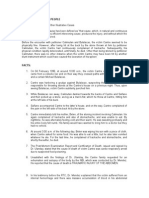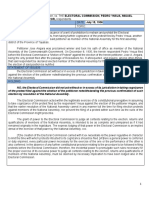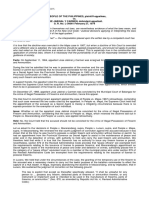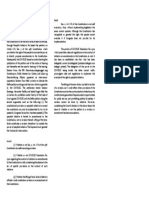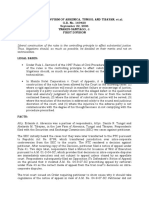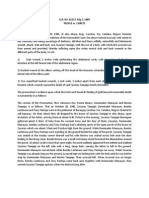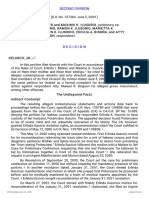People v. Tamani
Uploaded by
Kent A. AlonzoPeople v. Tamani
Uploaded by
Kent A. AlonzoPEOPLE V.
TAMANI
G.R. # 22160 & G.R. # 22161
Aquino, J
Digester: Alonzo, Group 6
NATURE: Appeal of Defendant Teodoro Tamani from the decision of the Court of First Instance of Isabela, (a) sentencing
him to "life imprisonment" for the murder of Jose Siyang and ordering him to indemnify the victim's heirs in the sum of
P6,000 and (b) further sentencing him to an indeterminate penalty of two (2) years, four (4) months and one (1) day
of prision correccional to eight (8) years and twenty-one (21) days of prision mayor for the attempted murder of
Eduardo Domingo and ordering him to indemnify the victim in the sum of P2,000
FACTS:
1. After respondent Tamani filed his appeal, the OSG filed a motion to dismiss, due to the fact that the notice of
appeal was 47 days late, to which Tamani’s counsel did not oppose
2. Action was deferred until the case was to be considered on its merits; but the Court held that this preliminary
question should first be resolved
3. Lower Court’s decision convicting Tamani was promulgated on Feb. 14, 1963; a copy was given to his then
counsel by Feb. 25, 1963.
4. Tamani’s camp then filed a Motion for Reconsideration on March 1, 1963, which was denied. The copy of the
order of denial was served on July 13, 1963 through his wife.
5. Starting from said date, he had 11 days (July 24, 1963) to appeal. This was the reglementary 15 day period for
appeal, but he only filed his appeal on September 10, 1963, 48 days from July 24.
6. Silvestre Bello, defendant’s counsel, argued that even if the appeal was received by Tamani’s wife on July 13,
it was never brought to his attention only until Sep. 7. He added that this was probably because his wife had
lost the envelope containing the order
7. The Trial court then opined that
a) the wife’s affidavit should have been submitted
b) a motion praying that the tardy appeal be given due course
8. But due to the gravity of the two penalties on the accused plus the plea of the defense, the RTC gave the
appeal its due course, while still allowing the OSG to “raise the question of jurisdiction on the ground of a late
appeal.”
ISSUE: When does the 15-day period start: from the date of promulgation or from the date of notice of the
Decision?
RULING: 15-day period commences from the date of promulgation.
RATIO:
1. Rule 122, Rules of Court :
SEC. 6. When appeal to be taken.—An appeal must be taken within fifteen (15) days from promulgation
or notice of the judgment or order appealed from. This period for perfecting an appeal shall be
interrupted from the time a motion for new trial is filed until notice of the order overruling the motion
shall have been served upon the defendant or his attorney.
2. The word MUST connotes a MANDATORY provision that said appeal should be EFFECTED WITHIN 15 DAYS from
the promulgation of the judgment
3. Tamani’s counsel clearly understood this due to the fact that he filed the Motion for Reconsideration on March
1, 15 days from the promulgation of the decision on Feb. 14
4. Thus, the word “promulgated” should be interpreted as referring to “judgment,” while the word “notice” should
be construed as referring to “order”
5. This construction is sanctioned by the rule of reddendo singula singulis: "referring each to each; referring each
phrase or expression to its appropriate object", or "let each be put in its proper place, that is, the words should
be taken distributively."
6. Therefore, when the order denying Tamani’s Motion for Reconsideration was served on July 13, he only had
one day to file his notice of appeal, not eleven days. His appeal that was filed on September 10, 1963, was also
58 days late. His appeal must be dismissed.
7. But due to the Court’s decision to uphold the appeal, due to the gravity of the crime, due course was given to
the respondent; the facts of the Criminal case are as follows: (I did not include this anymore; it does not seem
relevant to our lesson)
DECISION if re: the Appeal: DISMISSED
You might also like
- Re: Query of Mr. Roger C. Prioreschi Re Exemption From Legal and Filing Fees of The Good Shepherd Foundation, Inc.No ratings yetRe: Query of Mr. Roger C. Prioreschi Re Exemption From Legal and Filing Fees of The Good Shepherd Foundation, Inc.7 pages
- Commissioner of Customs V The Court of Tax AppealsNo ratings yetCommissioner of Customs V The Court of Tax Appeals1 page
- In Re Demetria (A.M. No. 00-7-09-CA - March 27, 2001)No ratings yetIn Re Demetria (A.M. No. 00-7-09-CA - March 27, 2001)3 pages
- BPI v. CBP, G.R. No. 197593, October 12, 2020No ratings yetBPI v. CBP, G.R. No. 197593, October 12, 20209 pages
- Persons and Family Relations Notes PDF FreeNo ratings yetPersons and Family Relations Notes PDF Free13 pages
- Olaquer vs. MC No. 4, 150 SCRA 144 (1987)No ratings yetOlaquer vs. MC No. 4, 150 SCRA 144 (1987)36 pages
- People vs. Padduyaman G.R. No. 120344 January 23, 2002No ratings yetPeople vs. Padduyaman G.R. No. 120344 January 23, 20022 pages
- Emilio A. Gonzales III v. Office of The President, Etc., Et Al GR 196231 & Wendell Bareras-Sulit v. Atty. Paquito N. Ochoa, JR., Et Al. GR 196232100% (1)Emilio A. Gonzales III v. Office of The President, Etc., Et Al GR 196231 & Wendell Bareras-Sulit v. Atty. Paquito N. Ochoa, JR., Et Al. GR 19623250 pages
- Tiu v. Guingona, G.R. No. 127410, January 20, 1999No ratings yetTiu v. Guingona, G.R. No. 127410, January 20, 19998 pages
- Efren Pana vs. Heirs of Jose Juanite, Sr. and Jose Juanite, JrNo ratings yetEfren Pana vs. Heirs of Jose Juanite, Sr. and Jose Juanite, Jr1 page
- Alfredo de Guzman, Jr. vs. People of The Philippines G.R. No. 178512 26 NovemberNo ratings yetAlfredo de Guzman, Jr. vs. People of The Philippines G.R. No. 178512 26 November8 pages
- Facts: The Main Target of This Petition Is Section 35 ofNo ratings yetFacts: The Main Target of This Petition Is Section 35 of17 pages
- Abrenica v. Law Firm of Abrenica (G.r. No. 169420)No ratings yetAbrenica v. Law Firm of Abrenica (G.r. No. 169420)3 pages
- 115 - PEOPLE Vs Balmores - GR L1896 - 16feb1950No ratings yet115 - PEOPLE Vs Balmores - GR L1896 - 16feb19503 pages
- 6 Crim1 - People Vs Pajares - Immediate Vindication of Grave OffenseNo ratings yet6 Crim1 - People Vs Pajares - Immediate Vindication of Grave Offense2 pages
- Redendo Singula Singuhis 96. PEOPLE OF THE PHILIPPINES, Plaintiff-Appellee, vs. TEODORO TAMANI, Accused-AppellantNo ratings yetRedendo Singula Singuhis 96. PEOPLE OF THE PHILIPPINES, Plaintiff-Appellee, vs. TEODORO TAMANI, Accused-Appellant2 pages
- PHILIPPINE AIRLINES v. AIRLINE PILOTS ASSOCIATION OF PHILIPPINESNo ratings yetPHILIPPINE AIRLINES v. AIRLINE PILOTS ASSOCIATION OF PHILIPPINES3 pages
- Rowena A. Santos V Integrated Pharmaceutical IncNo ratings yetRowena A. Santos V Integrated Pharmaceutical Inc2 pages
- First Issue: On P&G Being The Proper Party: Suit or Proceeding Shall Be Maintained in Any Court For The RecoveryNo ratings yetFirst Issue: On P&G Being The Proper Party: Suit or Proceeding Shall Be Maintained in Any Court For The Recovery5 pages
- LITA ENTERPRISES v. Second Civil Cases DivisionNo ratings yetLITA ENTERPRISES v. Second Civil Cases Division2 pages
- SPOUSES OMAR and MOSHIERA LATIP, Petitioners, vs. ROSALIE PALAÑA CHUA, Respondent. G.R. No. 177809 - October 16, 2009 - Alonzo Nachura, J.No ratings yetSPOUSES OMAR and MOSHIERA LATIP, Petitioners, vs. ROSALIE PALAÑA CHUA, Respondent. G.R. No. 177809 - October 16, 2009 - Alonzo Nachura, J.4 pages
- Workmen v. Firestone Tyre & Rubber Co. of India (P) LTD., para 32No ratings yetWorkmen v. Firestone Tyre & Rubber Co. of India (P) LTD., para 3239 pages
- United States v. Leavie Dallas King, III, 11th Cir. (2010)No ratings yetUnited States v. Leavie Dallas King, III, 11th Cir. (2010)2 pages
- United States Court of Appeals, Tenth CircuitNo ratings yetUnited States Court of Appeals, Tenth Circuit3 pages
- Joseph S. Haas v. David L. Kent, 803 F.2d 744, 1st Cir. (1986)No ratings yetJoseph S. Haas v. David L. Kent, 803 F.2d 744, 1st Cir. (1986)3 pages
- Crisologo-Jose Land Bank: G.R. No. 167399 June 22, 2006 Garcia, JNo ratings yetCrisologo-Jose Land Bank: G.R. No. 167399 June 22, 2006 Garcia, J9 pages
- Abbot Laboratories Phils. v. Abbot LaboratoriesNo ratings yetAbbot Laboratories Phils. v. Abbot Laboratories2 pages
- Jan Anson Vicory and Charles Wallis Crocker v. John T. Willingham, Warden, 354 F.2d 644, 10th Cir. (1965)No ratings yetJan Anson Vicory and Charles Wallis Crocker v. John T. Willingham, Warden, 354 F.2d 644, 10th Cir. (1965)3 pages
- Raids Response Materials 2B List of Immigration Court AddressesNo ratings yetRaids Response Materials 2B List of Immigration Court Addresses15 pages
- ROBERT HAGEL, Plaintiff - Appellant, v. PORTLAND STATE UNIVERSITYNo ratings yetROBERT HAGEL, Plaintiff - Appellant, v. PORTLAND STATE UNIVERSITY3 pages
- Riverside County Superior Court Ruling On Compass Danbe Centerpointe ProjectNo ratings yetRiverside County Superior Court Ruling On Compass Danbe Centerpointe Project23 pages
- U.S. District Court Southern District of New York (Foley Square) CRIMINAL DOCKET FOR CASE #: 1:11-cr-00205-AKH-4No ratings yetU.S. District Court Southern District of New York (Foley Square) CRIMINAL DOCKET FOR CASE #: 1:11-cr-00205-AKH-47 pages
- Williams v. Techtronic Industries of North, 1st Cir. (2015)No ratings yetWilliams v. Techtronic Industries of North, 1st Cir. (2015)4 pages
- Encargado (Overseer) Who Worked For The Complainants (Co-Owners of The Lot in Issue) - TheNo ratings yetEncargado (Overseer) Who Worked For The Complainants (Co-Owners of The Lot in Issue) - The2 pages























